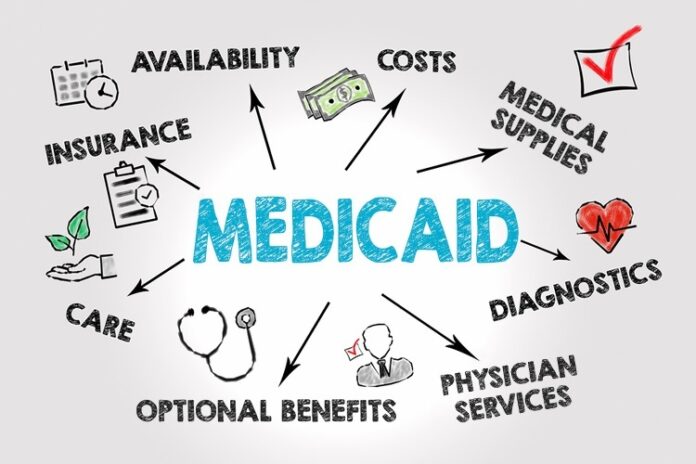State of Connecticut Stepping Up for Residents
By Barbara Heimlich
Democratic and Republican legislators in Connecticut have for months been sounding the alarm on how changes to the federal Medicaid funding in the name of tax cuts could cause harm to millions of residents.
Earlier this week, they caught their first glimpse into how some congressional leaders proposed to cut nearly $880 billion from Medicaid, including eligibility changes and a new work requirement.
Republicans in the U.S. House of Representatives on Thursday passed President Donald Trump’s “big, beautiful” tax bill out of the chamber on a narrow vote. Every Democrat on the floor voted no, as did Republican Reps. Warren Davidson of Ohio and Thomas Massie of Kentucky. Rep. Andy Harris, R-Md., who chairs the conservative House Freedom Caucus, voted present. The final vote tally was 215-214.
Wall Street investors were not as enthusiastic about the tax cut package as Republicans in Washington were. Dow futures were set to open lower on Thursday, as analysts and corporate leaders worried that Trump’s expensive spending bill will lead to exploding federal deficits and weaker long-term fiscal health for the nation. The 30-year Treasury bond yield hit 5.09% on Wednesday.
Democrats, likewise, are vehemently opposed to the bill’s steep cuts to the social safety net in order to pay for some of the tax cuts Trump promised on the campaign trail last year.
An analysis from the nonpartisan Congressional Budget Office estimates that if the bill were to become law, “in general, resources would decrease for households in the lowest decile (tenth) of the income distribution, whereas resources would increase for households in the highest decile.”
The package still faces a complicated path through the Senate. The upper chamber will consider the legislation under a set of rules called budget reconciliation, which requires only a simple majority to pass instead of the typical 60 votes required to move bills through the Senate. Several Republican senators have already said they will require significant changes to the bill before agreeing to vote for it.
The amendments contained a four-fold increase in the cap on deductions that federal income tax filers can claim for state and local taxes they paid. The maximum SALT (State and Local Tax) deduction increases from its current level of $10,000 to $40,000, for taxpayers reporting less than $500,000 in income.
Facing a nearly $300 million projected shortfall in Medicaid, Gov. Ned Lamont signed a Declaration of the Existence of Extraordinary Circumstances on Monday to keep Medicaid fully funded for the rest of the 2025 fiscal year.
The Connecticut General Assembly approved a plan Monday to cover $466 million in state agency overspending — including a $284 million problem in Medicaid — even though it means Connecticut’s budget would exceed the constitutional spending cap for the first time since 2007.
Increases in costs are being driven by several factors, including changes in the enrollment mix, rising home health and pharmacy costs, and overall increased utilization of services across the program. Lamont said the shortfall will begin on May 21st unless the legislature takes action.
To contain costs, Lamont said he has proposed repealing the GLP-1s for weight loss only starting in June, as well as changing Connecticut’s home-based services program to a waiver, which will limit enrollment. DSS plans to provide stronger oversight of pharmacies to ensure patients receive the medication they need, without waste.
“Absent immediate action, the state will lack sufficient appropriations by May 21, 2025, to make timely payments to hospitals, physicians, behavioral health providers, nursing homes, and other healthcare professionals, thereby threatening the delivery of medical care and risk worsening health outcomes, increased long-term costs, and loss of federal matching funds,” the declaration reads.
Connecticut lawmakers and advocates are still reading through the “good, bad and ugly” of the proposal. The bill is confirming Democratic legislators’ worst fears — “an ax to the Medicaid program” that covers 1.2 million people in Connecticut, said state Sen. Matt Lesser, D-Middletown, in a press conference Monday.
Where will the $284 million come from? The General Fund is projected to end the fiscal year ending June 30, 2025, with a surplus in excess of $450,000,000, sufficient to address the Medicaid deficiency, Lamont said.
“Our most vulnerable residents, including seniors and those with disabilities, receive health coverage through Medicaid and it is important that we authorize the funding necessary to ensure these payments continue to be made and people can access the care they need,” Lamont said in a prepared statement. “Connecticut is not alone on this issue as many states are confronting funding issues with Medicaid that are being driven by several intersecting factors. I am hopeful that a unanimous, bipartisan majority of legislators in the General Assembly will agree that we have an obligation to support Medicaid and the people who depend on it for care.”
Lamont’s declaration clarifies that this additional expenditure shall not be considered general budget expenditures for the 2025 fiscal year for the purposes of determining general budget expenditures for 2026 fiscal year.
President Donald Trump’s “big, beautiful” tax bill unveiled late Sunday night by the U.S. Energy and Commerce Committee, cuts federal costs through several provisions focused on environmental and health to cover $4.5 trillion in 2017 tax breaks set to expire at the end of the year. Some of the changes include, but aren’t limited to:
- Implementing a monthly 80-hour work or community service requirement for able-bodied adults without children to stay enrolled.
- Creating stricter eligibility rules and more paperwork for enrollees, such as checking eligibility twice a year instead of once and allowing states to check income and residency more often.
- Preventing states from charging hospitals higher prices for Medicaid services than Medicare pays.
- Implementing a $35 co-payment for medical services for enrollees who are above a set income limit
- Funding changes that bar gender-affirming care for trans minors and reduce federal money to Planned Parenthood.
“This bill has a number of provisions that seem designed to hurt people in Connecticut,” said Lesser, who is also the state legislature’s Human Services Committee co-chair.
The General Assembly still needs to sign off on the changes, and Lamont is proposing the funding come from the state’s general fund surplus.
The Connecticut Department of Social Services (DSS) is responsible for administering Medicaid in Connecticut. The department estimates that it will need an additional $284 million to ensure that payments continue to be made to health care providers under this program. More than 900,000 Connecticut residents receive health coverage through Medicaid, including children, older adults, individuals with disabilities, and low-income families.
Connecticut children and their parents or a relative caregiver, and pregnant women may be eligible for HUSKY A (also known as Medicaid), depending on family income. Uninsured children under age 19 in higher-income households may be eligible for HUSKY B (also known as the Children’s Health Insurance Program). Depending on specific income level, family cost-sharing applies.
[Note: When looking at the HUSKY family income guidelines, please keep in mind that they may not count some of your income and may also deduct certain expenses.]
HUSKY C (including Long-Term Services & Supports, and Medicaid for Employees with Disabilities). Connecticut residents who are 65 years of age or older, and/or who are blind or disabled, may qualify for Medicaid coverage under HUSKY C.
Income and asset eligibility varies, depending on which part of HUSKY C you may qualify for:
Monthly income limits: Single person – $835, Married couple – $1128.
Asset limits are as follows: Single person – $1600; Married couple – $2400.
If you are a working disabled individual, and your income and/or assets exceed the limits listed above, you may still qualify for Medicaid for Employees with Disabilities. For more information see below or visit www.ct.gov/med.
Medicaid for Employees with Disabilities:
Income limit: Earnings up to $85,000/year; Asset limits: Single person – $20,000,
Married couple – $30,000.
Long-Term Care Medicaid (Long-Term Services and Supports):
Institutionalized Individuals: Income limit, Single Person – $2,829, Asset Limits; Single person – $1,600; Married couple – Based on CSPA (Community Spousal Protected Amount)
The legislation excludes many of the significant cuts lawmakers and advocates were concerned about at the beginning of the Trump administration. However, the changes are still drastic, leaving state lawmakers worried. A nonpartisan report from the Congressional Budget Office said the bill could reduce health insurance enrollees by as many as 8.6 million people over the next decade.
A spokesperson for the state Department of Social Services said the staff is modeling what federal cuts could mean for Connecticut and its members now that there’s a more clear picture. The department is working with state officials in an effort to mitigate damage and preserve access to care.
Another provision of the proposed bill would reduce funding to states that continue to offer Medicaid coverage to undocumented residents. In Connecticut, Medicaid is currently expanded to children under 15 years old regardless of immigration status, funded by the state. Lesser said the state could see a 10% decrease in funds, violating state and federal commandeering laws.
“This will have to be litigated in the courts, but it seems like a huge overreach for the federal government to tell states what they can do with their own funds,” he said. “We’re not relying on Medicaid. We’re not asking Medicaid for anything. We’re just trying to keep families in Connecticut healthy and safe.”
The proposed bill faces a long legislative road ahead of hearings and debates through the U.S. House and Senate. For it to pass, NBC News said it would need almost all Republican lawmakers in the House to vote in favor of it.
Connecticut House Republican Leader Vincent Candelora, R-North Branford, said the proposal is less dramatic than the “doomsday scenarios” Connecticut Democrats have painted. He said the party members in Washington are more focused on controlling Medicaid’s cost growth, not dismantling it, with the proposed draft offering “reasonable ingredients for a final product.”
“Proposals like modest work requirements for able-bodied adults and enhanced verification checks aim to encourage workforce participation and add a layer of taxpayer accountability — a concept the majority party here instinctively resists,” Candelora said in an email statement to CT Insider. “All that said, it’s prudent to watch how this unfolds before jumping to conclusions or setting off alarm bells.”
Angela Mattie, a professor of management and medical sciences at Quinnipiac University, said the proposed bill is “short-sighted” and will impact the most vulnerable communities. She said taking away access to Medicaid coverage leads to worse health conditions and more people needing emergency care to treat them. At the same time, she said the hospitals and clinics will most likely bear the brunt of covering health care costs, despite already working on the fiscal margins and with historically low Medicaid reimbursement rates.
Although the exact price tag to Connecticut’s Medicaid program is to be determined, Mattie said she imagines that some benefits not mandated by federal law may be scaled back, like dental and home care. She also questions how specific changes, like work requirements, could be implemented nationally.
“If we don’t stand up, we’re going to have a public health infrastructure and a health care infrastructure that is completely eroded,” she said.
Where will the $284 million come from? The General Fund is projected to end the fiscal year ending June 30, 2025, with a surplus in excess of $450,000,000, sufficient to address the Medicaid deficiency, Lamont said.
Multiple sources contributed to this article including: State of Connecticut; CT Insider; Patch newsletters and alerts; Angela Mattie, a professor of management and medical sciences at Quinnipiac University; Connecticut Post Staff Writer Ken Dixon



